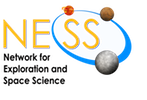








Course Description
This course presents students with current public policy issues in space science and space exploration. Students research and debate both sides of the issues, which include strategies and spin-offs of space exploration, funding of science, big vs. small space missions, and community decadal surveys and reports. No prerequisites are required, but it is helpful if students have taken ASTR 1110 and 1120, or equivalent, or PHYS 1110 and 1120, or PHYS 2010 and 2020 before enrolling in ASTR 4800. Approved for the arts and sciences core curriculum: critical thinking.
In Astronomy 4800 – Space Science: Practice & Policy, we will explore the science goals and technology of major space science missions as well as the public policy process that leads to selecting and funding such missions. The class begins with an historical overview of the first international space programs in the Soviet Union and the United States. We will read and analyze classic science policy papers that advocated the creation of the first science funding agencies (such as NASA) and contrast these with recent influential reports from the National Academy of Sciences. In this class, we will review the science and mission plans from the Decadal Surveys of Astrophysics, Planetary Science, and Heliophysics. Major missions such as the Mars Perserverance, the New Horizons mission to Pluto, and the James Webb Space Telescope will be presented by guest speakers and by members of the class.
We will have a number of exciting guest speakers, possibly including a former NASA Administrator, NASA Associate Administrator for Science, a NASA Center Director, Space Shuttle astronaut, executives from aerospace industries in Colorado and new space start-up companies, and lead investigators of space science missions (e.g., JUNO, MAVEN, New Horizons) to speak with our class. Class members will do role-playing to simulate hearings before the Congressional science committees and debates on issues such as concepts for missions to the Moon and to Mars. A number of classes will be held in the Fiske Planetarium.
-->





 University of Colorado
University of Colorado APS Department
APS Department